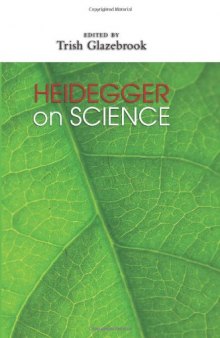دانلود کتاب Heidegger on Science
by Heidegger, Martin, Heidegger, Martin, Glazebrook, Trish|
|
عنوان فارسی: هایدگر در علوم |
 دانلود کتاب
دانلود کتاب
 جزییات کتاب
جزییات کتاب
اولین مجموعه مقالات اختصاص یافته به سهم هایدگر در درک علم مدرن. اگرچه مارتین هایدگر به خاطر کارش روی فناوری شناخته شده است، اما او غالباً در بافت علم به معنای وسیع کلمه مورد بحث قرار نمیگیرد. این مجموعه اولین نمایشگاه چشماندازهای متنوع درباره ارزیابیهای هایدگر از علوم است و به روشهای مختلفی که نوشتههای هایدگر به پرسشهای مربوط به اینکه چگونه دنیا را از طریق علم درک میکنیم، میپردازد. با توجه ویژه به نظریه کوانتوم، علوم طبیعی، علوم فناوری و بخشی اختصاص یافته به بررسی آنچه هستی و زمان درباره علم بیان میکند، این کتاب برای دانشمندان در حوزهها و سنتهای متنوعی جالب خواهد بود. این کتاب با بررسی پرسشهایی درباره پایداری و اخلاق که توسط درگیری هایدگر با علوم مطرح شدهاند، به پایان میرسد.
این مقالات توسط دانشمندان برجسته در زمینه مطالعات هایدگر، خوب نوشته شدهاند، منطقی استدلال شدهاند، اصیل هستند و بینشهای جدید بسیاری ارائه میدهند. محققان هایدگر و محققان سایر زمینهها بسیار از این کتاب بهره خواهند برد. - هولگر زابوروفسکی، دانشگاه کاتولیک آمریکا
این کتاب غنای خاص اندیشه هایدگر درباره علم را آشکار میکند و سهم مهمی به مطالعه فلسفه هایدگر و تجزیه و تحلیل انتقادی علم مدرن میکند. پیشرو، در پیشاپیش تفکر فلسفی است. - کریستین بکر، دانشگاه ایالتی پنسیلوانیا








 این کتاب رو مطالعه کردید؟ نظر شما چیست؟
این کتاب رو مطالعه کردید؟ نظر شما چیست؟
